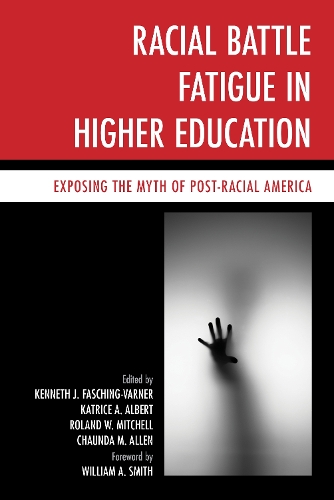
Racial Battle Fatigue in Higher Education: Exposing the Myth of Post-Racial America
(Hardback)
Publishing Details
Racial Battle Fatigue in Higher Education: Exposing the Myth of Post-Racial America
By (Author) Kenneth J. Fasching-Varner
Edited by Katrice A. Albert
Edited by Roland W. Mitchell
Edited by Chaunda Allen
Foreword by William A. Smith
Bloomsbury Publishing PLC
Rowman & Littlefield Publishers
23rd December 2014
United States
Classifications
Tertiary Education
Non Fiction
Educational strategies and policy: inclusion
Philosophy and theory of education
378.73
Physical Properties
Hardback
270
Width 162mm, Height 232mm, Spine 25mm
531g
Description
Racial Battle Fatigue is described as the physical and psychological toll taken due to constant and unceasing discrimination, microagressions, and stereotype threat. The literature notes that individuals who work in environments with chronic exposure to discrimination and microaggressions are more likely to suffer from forms of generalized anxiety manifested by both physical and emotional syptoms. This edited volume looks at RBF from the perspectives of graduate students, middle level academics, and chief diversity officers at major institutions of learning. RBF takes up William A. Smiths idea and extends it as a means of understanding how the academy or higher education operates. Through microagressions, stereotype threat, underfunding and defunding of initiatives/offices, expansive commitments to diversity related strategic plans with restrictive power and action, and departmental climates of exclusivity and inequity; diversity workers (faculty, staff, and administration of color along with white allies in like positions) find themselves in a badlands where identity difference is used to promote institutional values while at the same time creating unimaginable work spaces for these workers.
Reviews
Post-RacialBah humbug! Exponentially! There are many scholarly attributes to Racial Battle Fatigue in Higher Education. Illuminating, grounded and instructive are a few congratulatory words that can be offered about this volume on the myth of post-racial America. I like Racial Battle Fatigue because it is practical and now. Practical in that knowledge and understanding about race and its intersecting companions gender and class that are on the loose in our global neoliberal society because of nuanced dyconsciousness and blindspots. Now because it addresses how and where the evils of racism (sexism and classism) currently exist in the academy, thereby continuing a legacy of personal and institutional hurt fortoward people of color and people who are othered. -- Carl A. Grant, author of The Moment: Brack Obama, Jeremiah Wright and the Firestorm and Trinity United Church of Christ (2013) (with Shelby Grant) and Editor of Intersectionality and Urban Education (2014) (with Elisabeth Zwier), Hoefs-Bascom Professor, University Wisconsin-Madison
Racial Battle Fatigue in Higher Education is a timely book amidst an onslaught of color-blind racism and the over-representation of people of color in the prison-industrial complex. This book demonstrates the more personal and individual struggle of how racism operates in the micro-interactions of everyday life. A timely book indeed. -- Abraham P. DeLeon, associate professor,Educational Leadership & Policy Studies, University of Texas at San Antonio
The editors of this volume have rightfully taken Smith's concept of racial battle fatigue to the "hollowed halls" of higher education. As time moves forward, it will continue stand as testament to the need for an explicit, concrete conversation on the layered, complex manifestations of racsim/White supremacy in people and systems. Thanks to them and their contributors for entering the difficult, but necessary work! -- David Stovall, Ph.D., associate professor, University of Illinois at Chicago
The myth that race no longer matters in our society or affects one's daily lived experiences is carefully and brilliantly tackled in Racial Battle Fatigue in Higher Education: Exposing the Myth of Post-Racial America. Through touching personal narratives, theory-building essays, and expositions of empirical research, this hefty volume assembles an eclectic gathering of voices from graduate students and faculty, to diversity officers to examine the effects of systemic racism in Higher Education. -- Yolanda Sealey-Ruiz, assistant professor, Teachers College, Columbia University
Author Bio
Kenneth (Kenny) Fasching-Varner is a Shirley B. Barton Endowed Assistant Professor at Louisiana State University who teaches classes on Critical Race Theory, Multiculturalism, International Education, and Elementary Education. He also serves as the director of the LSU Teaching in Chile Study Abroad Program. Katrice A. Albert is the vice president for Equity and Diversity at the University of Minnesota. Albert also serves on the editorial board of the Journal of Civic Engagement and Scholarship, and her works have been published in the Journal of Counseling Psychology and the Journal of Counseling and Development. Albert is also the co-editor of the forthcoming volume, Trayvon Martin, Race, and American Justice: Writing Wrong. Chaunda M. Allen is the assistant to the vice provost at Louisiana State University as well as the Director of the Office of Multicultural Affairs Roland Mitchell is an associate professor of education at Louisiana State University and the editor of the College Student Affairs Journal and Higher Education Section Editor of the Journal of Curriculum Theorizing. He also serves as the associate director of LSUs School of Education.
